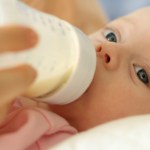child development
The latest issue of the journal Science has an essay by Greg Miller looking at the explosion of research into epigenetics and what this work could suggest about human society.
In 2004, Szyf and Meaney published a paper in Nature Neuroscience that helped launch the behavioral epigenetics revolution. It remains one of the most cited papers that journal has ever published. The paper built on more than a decade of research in Meaney's lab on rodent mothering styles.
Rat moms vary naturally in their nurturing tendencies. Some lick and groom their pups extensively and arch their backs to make it…
This seems to have become unofficial volcano week, here at ScienceBlogs. If you haven't been following the coverage of the Eyjafjallajökull eruption at Erik Klemetti's Eruptions blog, you should consider doing so. Also, Dr. Isis has a post on how the eruption has fouled up all nuclear imaging plans at her place of research, and Ethan explains how volcanic lightening works.
Our benevolent overlords have further commented: "Eyjafjallajökull's ill temper has been an unexpected object lesson in the complexity and interconnectedness of our environment, technology, and social networks." To that I…
(Source)
But which one should be diagnosed?
Diagnostic criteria for 313.81 Oppositional Defiant Disorder
A. A pattern of negativistic, hostile, and defiant behavior lasting at least 6 months, during which four (or more) of the following are present:
(1) often loses temper
(2) often argues with adults
(3) often actively defies or refuses to comply with adults' requests or rules
(4) often deliberately annoys people
(5) often blames others for his or her mistakes or misbehavior
(6) is often touchy or easily annoyed by others
(7) is often angry and resentful
(…
Yesterday Kiera Butler, associate editor at Mother Jones, posted an article claiming that soy-based veggie burgers and infant formula are "made with the chemical hexane, an EPA-registered air pollutant and neurotoxin." She based her conclusions on a report put out by The Cornucopia Institute, an organization committed to "ecological principles and economic wisdom underlying sustainable and organic agriculture."
If you've heard about hexane before, it was likely in the context of gasoline--the air pollutant is also a byproduct of gas refining. But in 2007, grain processors were responsible…
This article is reposted from the old Wordpress incarnation of Not Exactly Rocket Science.
Attention-deficit hyperactivity disorder is the most common developmental disorder in children, affecting anywhere between 3-5% of the world's school-going population. As the name suggests, kids with ADHD are hyperactive and easily distracted; they are also forgetful and find it difficult to control their own impulses.
While some evidence has suggested that ADHD brains develop in fundamentally different ways to typical ones, other results have argued that they are just the result of a delay in the…
Huxley Laden has just entered the world at a whopping 7 lbs. 11 oz. Please head over to Greg Laden's blog and offer your congratulations.
As regular readers will know, my partner and I had our own primate in June (8 lbs. 6 oz.). Hopefully Sagan and Huxley will have the chance to play together in the virtual playground as they grow up.
Telling the difference between a German and French speaker isn't difficult. But you may be more surprised to know that you could have a good stab at distinguishing between German and French babies based on their cries. The bawls of French newborns tend to have a rising melody, with higher frequencies becoming more prominent as the cry progresses. German newborns tend to cry with a falling melody.
These differences are apparent just three days out of the womb. This suggests that they pick up elements of their parents' language before they're even born, and certainly before they start to…
From a young age, children learn about the sounds that animals make. But even without teaching aides like Old Macdonald's farm, it turns out that very young babies have an intuitive understanding of the noises that humans, and even monkeys, ought to make. Athena Vouloumanos from New York University found that at just five months of age, infants match human speech to human faces and monkey calls to monkey faces. Amazingly, this wasn't a question of experience - the same infants failed to match quacks to duck faces, even though they had more experience with ducks than monkeys.
Voloumanos…
Researchers from Simon Fraser University, just a stone's throw from where I sit in Vancouver, have determined that the side effects from this endocrine disruptor can alter children's behavior:
Researchers have just linked prenatal exposure to bisphenol-A - a near-ubiquitous industrial chemical - with subtle, gender-specific alterations in behavior among two year olds. Girls whose mothers had encountered the most BPA early in pregnancy tended to become somewhat more aggressive than normal, boys became more anxious and withdrawn.
Another recent study, by Joe Braun of the University of North…
Domestic dogs are very different from their wolf ancestors in their bodies and their behaviour. They're more docile for a start. But man's best friend has also evolved a curious sensitivity to our communication signals - a mental ability that sets them apart from wolves and that parallels the behaviour of human infants. Dogs and infants are even prone to making the same mistakes of perception.
Like infants less than a year old, dogs fail at a seemingly easy exercise called the "object permanence task". It goes like this: if you hide an object somewhere(say a ball under a cup) and let…
This will be my first foray into baby blogging (technically it's my second, however the first ended up being somewhat accidental). What I hope to explore through these posts will be child development through the lens of anthropology and primatology as I observe my child going through various stages. I first wanted to explore a new idea (at least new to me) that my partner and I have been working with: early potty training, also known as Natural Infant Hygiene or Elimination Communication (EC).
The concept of EC is a simple one: mammals don't like to sit in their own waste and, if allowed…
How genes for altruism can benefit strangers as well as kin
The generosity of adoption has long been considered a unique human hallmark.
Image: Shadows of Forgotten Ancestors
For decades it was conventional dogma that humans were the only species that used tools. "Man the Toolmaker" was our celebrated designation. The hominin fossil Homo habilis (or "handy" man) was even defined within our genera primarily because the skeleton was associated with stone implements. However, when Jane Goodall discovered chimpanzees using modified sticks at Gombe to "fish" for termites, Louis Leakey famously…
As Eddie Izzard notes in the video above, the English, within our cosy, post-imperialist, monolingual culture, often have trouble coping with the idea of two languages or more jostling about for space in the same head. "No one can live at that speed!" he suggests. And yet, bilingual children seem to cope just fine. In fact, they pick up their dual tongues at the same pace as monolingual children attain theirs, despite having to cope with two sets of grammar and vocabulary. At around 12 months, both groups produce their first words and after another six months, they…
Offspring Abandonment in the Ancient and Natural World
In the Greek tragedy Oedipus Rex the great kingdom of Thebes is condemned following a case of mistaken identity (and a little patricide). The sordid tale begins when the infant prince is abandoned by his parents (see right) after learning of a prophecy that his son will one day murder his father, marry his mother and assume the throne. His ankles pierced with a spike, young Oedipus is sent to be abandoned atop mount Cithaeron. While this tale sets up a beautiful tragedy it also hints at a common reality in both the ancient and…
We all know them - supremely confident, arrogant people with inflated views of themselves. They strut and swagger, seemingly impervious to critical opinions, threats of failure or the glare of self-awareness. You may be able to tell that I don't like such people very much, which is why new research from Sander Thomaes from Utrecht University makes me smirk.
Thomaes found that people with unrealistically inflated opinions of themselves, far from proving more resilient in the face of social rebuffs, actually suffer more because of it. Some psychologists hold that "positive illusions" provide…
Our newborn takes after his father.The following is something of an impromptu experiment in live birth twittering. It started out simply as a means to update friends and family, but as events transpired we received some unexpected international attention. The entire labor lasted 47 hours, involved three different locations and two surgeries. This after we had carefully planned for a natural birth with no interventions. Thank you to the hundreds of people in at least eight countries who followed our story and sent messages of support. Special thanks to Henry Gee, Senior…
Discriminating against people who do not speak your language is a big problem. A new study suggests that the preferences that lead to these problems are hard-wired at a very young age. Even five-month-old infants, who can't speak themselves, have preferences for native speakers and native accents.
The human talent for language is one of our crowning evolutionary achievements, allowing us to easily and accurately communicate with our fellows. But as the Biblical story of the Tower of Babel relates, linguistic differences can serve to drive us apart and act as massive barriers between…
The autism spectrum disorders (ASDs), including autism and its milder cousin Asperger syndrome, affect about 1 in 150 American children. There's a lot of evidence that these conditions have a strong genetic basis. For example, identical twins who share the same DNA are much more likely to both develop similar autistic disorders than non-identical twins, who only share half their DNA.
But the hunt for mutations that predispose people to autism has been long and fraught. By looking at families with a history of ASDs, geneticists have catalogued hundreds of genetic variants that are linked to…
Learning a new language as an adult is no easy task but infants can readily learn two languages without obvious difficulties. Despite being faced with two different vocabularies and sets of grammar, babies pick up both languages at the same speeds as those who learn just one. Far from becoming confused, it seems that babies actually develop superior mental skills from being raised in a bilingual environment.
By testing 38 infants, each just seven months old, Agnes Melinda Kovacs and Jacques Mehler have found that those who are raised in bilingual households have better "executive functions…
For all appearances, this looks like the skull of any human child. But there are two very special things about it. The first is that its owner was clearly deformed; its asymmetrical skull is a sign of a medical condition called craniosynostosis that's associated with mental retardation. The second is that the skull is about half a million years old. It belonged to a child who lived in the Middle Pleistocene period.
The skull was uncovered in Atapuerca, Spain by Ana Gracia, who has named it Cranium 14. It's a small specimen but it contains enough evidence to suggest that the deformity was…



